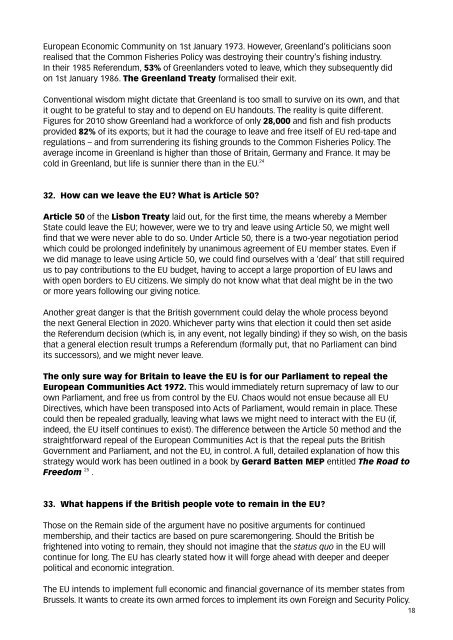EU Referendum FAQ v4
For those undecided in which way to vote in the EU referendum,this addresses the main questions and concerns people have
For those undecided in which way to vote in the EU referendum,this addresses the main questions and concerns people have
Create successful ePaper yourself
Turn your PDF publications into a flip-book with our unique Google optimized e-Paper software.
European Economic Community on 1st January 1973. However, Greenland’s politicians soon<br />
realised that the Common Fisheries Policy was destroying their country’s fishing industry.<br />
In their 1985 <strong>Referendum</strong>, 53% of Greenlanders voted to leave, which they subsequently did<br />
on 1st January 1986. The Greenland Treaty formalised their exit.<br />
Conventional wisdom might dictate that Greenland is too small to survive on its own, and that<br />
it ought to be grateful to stay and to depend on <strong>EU</strong> handouts. The reality is quite different.<br />
Figures for 2010 show Greenland had a workforce of only 28,000 and fish and fish products<br />
provided 82% of its exports; but it had the courage to leave and free itself of <strong>EU</strong> red-tape and<br />
regulations – and from surrendering its fishing grounds to the Common Fisheries Policy. The<br />
average income in Greenland is higher than those of Britain, Germany and France. It may be<br />
cold in Greenland, but life is sunnier there than in the <strong>EU</strong>. 24<br />
32. How can we leave the <strong>EU</strong>? What is Article 50?<br />
Article 50 of the Lisbon Treaty laid out, for the first time, the means whereby a Member<br />
State could leave the <strong>EU</strong>; however, were we to try and leave using Article 50, we might well<br />
find that we were never able to do so. Under Article 50, there is a two-year negotiation period<br />
which could be prolonged indefinitely by unanimous agreement of <strong>EU</strong> member states. Even if<br />
we did manage to leave using Article 50, we could find ourselves with a ‘deal’ that still required<br />
us to pay contributions to the <strong>EU</strong> budget, having to accept a large proportion of <strong>EU</strong> laws and<br />
with open borders to <strong>EU</strong> citizens. We simply do not know what that deal might be in the two<br />
or more years following our giving notice.<br />
Another great danger is that the British government could delay the whole process beyond<br />
the next General Election in 2020. Whichever party wins that election it could then set aside<br />
the <strong>Referendum</strong> decision (which is, in any event, not legally binding) if they so wish, on the basis<br />
that a general election result trumps a <strong>Referendum</strong> (formally put, that no Parliament can bind<br />
its successors), and we might never leave.<br />
The only sure way for Britain to leave the <strong>EU</strong> is for our Parliament to repeal the<br />
European Communities Act 1972. This would immediately return supremacy of law to our<br />
own Parliament, and free us from control by the <strong>EU</strong>. Chaos would not ensue because all <strong>EU</strong><br />
Directives, which have been transposed into Acts of Parliament, would remain in place. These<br />
could then be repealed gradually, leaving what laws we might need to interact with the <strong>EU</strong> (if,<br />
indeed, the <strong>EU</strong> itself continues to exist). The difference between the Article 50 method and the<br />
straightforward repeal of the European Communities Act is that the repeal puts the British<br />
Government and Parliament, and not the <strong>EU</strong>, in control. A full, detailed explanation of how this<br />
strategy would work has been outlined in a book by Gerard Batten MEP entitled The Road to<br />
Freedom 25 .<br />
33. What happens if the British people vote to remain in the <strong>EU</strong>?<br />
Those on the Remain side of the argument have no positive arguments for continued<br />
membership, and their tactics are based on pure scaremongering. Should the British be<br />
frightened into voting to remain, they should not imagine that the status quo in the <strong>EU</strong> will<br />
continue for long. The <strong>EU</strong> has clearly stated how it will forge ahead with deeper and deeper<br />
political and economic integration.<br />
The <strong>EU</strong> intends to implement full economic and financial governance of its member states from<br />
Brussels. It wants to create its own armed forces to implement its own Foreign and Security Policy.<br />
18







